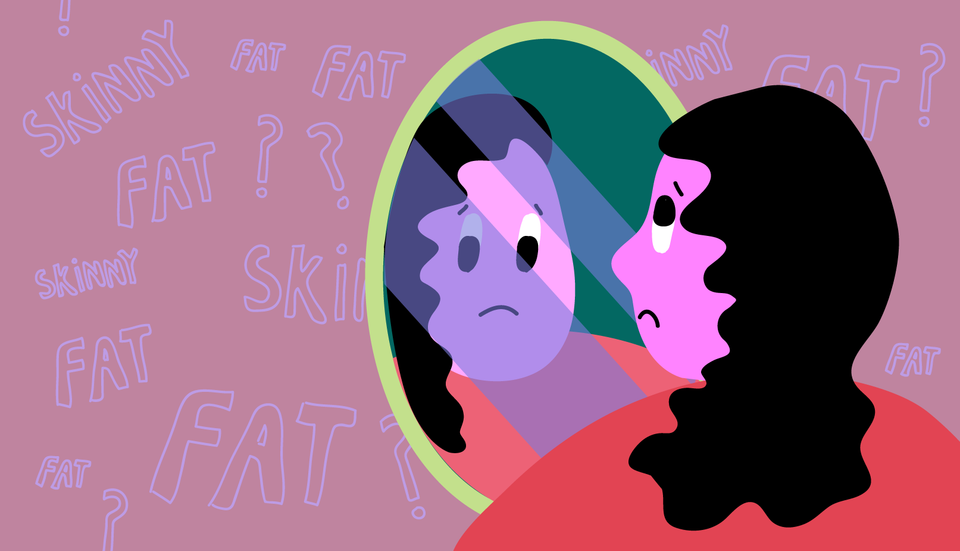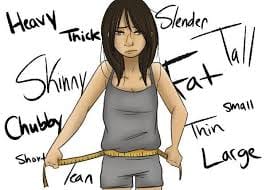Lose The Weight: How Body Shaming In Healthcare Risks Women's Health

“Bas weight kam kar lo, theek ho jao gi.” It’s a statement far too many women have heard across Pakistan and not in social settings, but in a doctor’s office. The very space meant to not only protect your health - mental and physical - but work on improving it often, starts doing the very opposite.
For 14 year old Sara* - a visit to the gynaecologist turned into a horrifying experience when the doctor started shaming her for her weight - and even went so far as to tell her father she should never eat carbs. “She even called her junior doctors in. I remember 6 male doctors and 2 female doctors were given a lecture on how and why women need to be fit or else they’ll look like me and she made me so uncomfortable that I wanted to cry. When I told her I don’t feel well she told me of course I wouldn’t because who could feel good with a body like mine,” she tells Echoes.
These comments and judgements from people she was hoping would help her feel better when she was sick only made her fear the doctors office, and become more and more wary of ever finding genuine help within the healthcare industry.
Now 28, she recalls how little seems to have changed over more than a decade. Last year when she went to get treatment for her eczema before her wedding, she overheard her treatment providers talking about why anyone would marry someone with her weight. The impact hasn’t only been limited to her mental health - although that isn’t anything to take lightly.
“To this date I can’t find a job in a health care environment because of my weight. Nobody wants ethics or morals, they want skinny health care professionals,” she shares of how its impacted her career as well.
Sara’s* experience isn’t unique. Body shaming across healthcare in Pakistan is experienced more commonly than we realise, or talk about. Its consequences aren’t just linked to low self esteem but rather end up directly impacting a patient's mental and physical health in far more serious ways. Most commonly, patients seek out doctors less and less which can lead to illness and health issues not being diagnosed in time. “Disrespectful treatment and medical fat shaming, in an attempt to motivate people to change their behavior, is stressful and can cause patients to delay health care seeking or avoid interacting with providers,” presenter Joan Chrisler, PhD, a professor of psychology at Connecticut College, said during a symposium titled “Weapons of Mass Distraction — Confronting Sizeism.”

When they do seek out medical intervention, they’re often cared for in less detail, and other possible factors are overlooked as doctors often blame weight for the health issues they are struggling with.
In one study of over 300 autopsy reports in the US, obese patients were 1.65 times more likely than others to have significant undiagnosed medical conditions (e.g., endocarditis, ischemic bowel disease or lung carcinoma), indicating misdiagnosis or inadequate access to health care. Similar data does not exist in Pakistan, but the stories shared with regards to healthcare access aren’t promising.
“I knew this top GP who would always shame my husband and me for not losing weight and coming to him, because all our issues were related to weight. He was not wrong, but I genuinely didn't want to go to him in times of emergency also because I knew the first thing he would do is out right fat shame me and tell me all my issues are related to weight and I was perfectly fine otherwise,” shares Taz* , adding that she believes these behaviours are a result of doctors not receiving the ethical training they need to deal with such situations.
For women, it can also make reproductive healthcare much worse - as many complaints are simply dismissed as a result of weight gain or not explored at all. That’s what happened to Sanober during and after her pregnancy and childbirth. After her first pregnancy, she shares that she began experiencing excruciating pelvic pain and her doctor’s only response was to tell her to lose weight. But even after making the effort and losing 10 kilos the pain wouldn’t go away. It was then that she ended up discussing her struggle with a family friend - who told her that she’d been through the same thing and that it had nothing to do with weight and all. That’s when Sanober ended up researching the issue on her own, started exploring yoga and finally found a solution.
3 years later, after she gave birth to her daughter, a bad slip and fall injured her tailbone, leaving her bedridden. Her doctor's response, telling her to lose weight.
“Doctors would say you don't have the age of surgery, and medicines will impact your organs, so we can't do anything else,” she shares with Echoes.
In that very trying time, she says her husband’s support to not let the weight focused comments get to her and never making her feel bad about her body meant a lot. For countless women who like Sanober or Taz* have faced ridicule or neglect from the healthcare system, even just getting more empathy can be a major shift in the way they receive care.
“I look around me and see so many women my age going through such severe health issues, and their families keep coming after them saying moti ho gayi ho, so no one is giving them space, everyone's expecting more and more from them.
And stress is the first thing that causes you to store fat - women are under so much stress because of all the expectations to do everything and manage everything on my own,” says Sanober.
There needs to be a greater push for more ethical, more empathetic healthcare. “I think compassion and empathy is required when it comes to healthcare systems,” Sanober tells Echoes. Taz agrees, saying, “I wish doctors would empathise, try to understand my behaviours, and that I felt safe in their presence instead of being judged.”
Anmol Irfan is a freelance journalist, editor and the co-founder of Echoes Media. Her work focuses on marginalised narratives in the Global South, looking at gender, climate, tech and more. She tweets @anmolirfan22

Member discussion